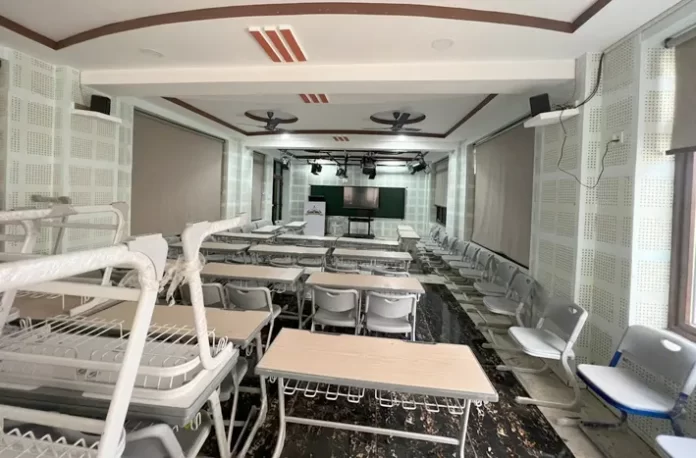[ Amar Sangno ]
ITANAGAR, 17 Oct: The fate of the much-touted e-learning studio and virtual classroom, established at the directorate of secondary education office in 2020 with the objective to improve the standard of education in the state during the Covid-19 pandemic, remains uncertain even after two academic sessions have passed.
This ambitious project was set up on the ground floor of the confidential cell for examination building of the directorate office complex in Itanagar, with an allocated budget of Rs. 400 lakhs. Initially, the project was proposed at Rs. 800 lakhs, but the finance department limited it to Rs. 400 lakhs. The project received funding from the Chief Minister’s Relief Fund (CMRF), amounting to Rs. 31 lakhs, and was implemented through the Deputy Resident Commissioner in Guwahati.
It is alleged that the project was conceptualized by the then chief secretary Naresh Kumar, and introduced into the education department through then secretary of education Niharika Rai. However, the former chief secretary did not respond to inquiries from this publication.
Despite being installed for three years, the project has failed to take off, with the e-learning studio reportedly lying unused. There is also a lack of clarity among officers in the directorate of secondary education regarding who should manage the central studio or the virtual classroom command center. The former secretary had assigned the special secretary of education as the nodal officer, with the state liaison officer assisting the special secretary, but operational guidelines were missing. Currently, a portion of the e-learning studio has been converted into Vidya Samiksha Kendra.
The ambitious project was made to look ‘lucrative’ by associating the prestigious Indian Institute of Technology (IIT) Madras. It was initially proposed to establish the e-studio in the state through the National Program for Technology Enhanced Learning (NPTEL) under MHRD, in partnership with IIT Madras, to ensure quality and sustainability. A memorandum of agreement was to be signed between the director of secondary education and IIT Madras for technical support and annual maintenance of the e-learning studio. The project also aimed to establish 100 more virtual classrooms in government higher secondary schools across the state.
However, the project was ultimately executed by a private firm, Shree Shyam Traders, based in Doomdooma, Assam. Civil works were carried out by the engineering wing of the education department. The education department justified its choice, stating that the rates quoted by Shree Shyam Traders were comparable to those provided by IIT Madras. This was documented in an official note on buff sheet and was vetted by the secretary of information technology (IT).
This move contradicted the project’s initial proposal, which had stated, “The state does not have, at present, in-house expertise, including via NIC, to take up this magnitude of work with adequate specialization. Therefore, the department explored government bodies/professional agencies which have competence for the creation of an e-learning studio.”
Krishnan Krishnamurty, executive producer and senior consultant at IIT Madras, who sent detailed project reports and estimates, accused the education department of extracting their data and details on the project but then not choosing to work with them.
“Strangely, they have taken all the data, even during Covid-time, and haven’t even had the courtesy to inform me that we weren’t chosen. I would have been fine with it if they had told me at least,” Krishnan Krishnamurty said. He also shared that IIT Madras had invested a lot in the project, sending senior professors to Arunachal to discuss it with government officials.
The education department’s engineering wing executed the civil works, costing Rs. 160.85 lakhs. These civil works included furnishing, upkeep, acoustic treatment, and air conditioning in existing rooms on the ground floor of the confidential cell for examination building. The engineering wing submitted a utilization certificate for these expenses on March 11, 2021. The private firm, Shree Shyam Traders, reportedly carried out installation works using the CMRF-funded amount of Rs. 31 lakhs. Reportedly, Shree Shyam Traders, lacking expertise, hired another firm called Qizar Solutions Pvt. Ltd for installation.
Sources within the department informed The Arunachal Times that there is an unspent balance of approximately Rs. 239 lakhs in the directorate of secondary school’s HDFC bank account.
It appears that the education department may have misled both the government and the finance department regarding this project. While seeking allocation, the department repeatedly mentioned IIT Madras in its proposal for obtaining finance concurrence for the establishment of the e-learning studio and digital classroom, yet the project was not executed by IIT Madras.
An official, speaking under conditions of anonymity, alleged, “The e-learning studio and digital classroom project is a classic case of parachuting and an ill-intended project. It was bulldozed by the then chief secretary, but even the director of DSE had no idea about it.”
It’s worth noting that IT teachers from government higher secondary schools in Itanagar and Arunodaya were trained by private firms to operate the studio. However, the virtual classes were not successful, as there were no receivers in any government schools across the state. Reportedly, a science class recorded in the studio was relayed on air through Arun Prabha on DDK Itanagar.



